By closely examining the sources, movements and persons of the Renaissance and Reformation, Eric Voegelin reveals the roots of today's political ideologies in this fourth volume of his ""History of Political Ideas"". This study lays the groundwork for his critique of the modern period and is essential to an understanding of his later analysis. Voegelin identifies not one but two distinct beginnings of the movement toward modern political consciousness: the Renaissance and the Reformation. This volume considers both periods and their presence in modern thought. Represented by the works of Niccolo Machiavelli, Desiderius Erasmus and Thomas More, the Renaissance is characterized by Voegelin as a struggle for balance. Exploring the transition from Renaissance to Reformation is a chapter entitled, ""The People of God"", which examines the sectarian movement. These pages contain the historical background that led to Voegelin's later conclusions about Gnosticism and its modern influences. Voegelin is unenthusiastic about the political philosophy of the Reformation, saying, ""We cannot connect it with the name of a single great political thinker"". Yet he illuminates the strengths and inadequacies of its key figures, Martin Luther and John Calvin. By analyzing the political ideas that first emerged during the Renaissance and Reformation, this volume provides a foundation for understanding the events of following centuries.
- ISBN13 9780826211552
- Publish Date 25 June 1998
- Publish Status Active
- Publish Country US
- Imprint University of Missouri Press
- Format Hardcover
- Pages 328
- Language English
